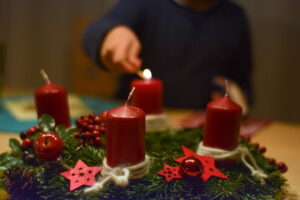Jeremiah 23: 1-6; Psalm 23; Ephesians 2: 13-18 (RM) or 11-22 (RCL); Mark 6:30-34 (RM) or 30-34, 53-56 (RCL).
Don’t you just hate cliffhangers?
It’s the last episode of the current series, and the plot line hits a crisis right at the end. Does the star live or die? Does the couple break up or get married? and if they get married, does the marriage last? There you sit. And you don’t find out what happened to your TV friends until next year. And maybe not even then.
This week’s Gospel contains a cliffhanger, but you have to read ahead in the Gospel of Mark to see what’s coming. We read that Jesus and his friends sought out a deserted place, but people kept finding them, so many that they hardly had time to eat. They took a boat but the people caught up with them. At a certain point Jesus felt sorry for the people, turned around, and began to teach them. That’s in verse 34. And that’s where our reading ends, at least the first part.
But in verse 35 we see where this story is going. Big crowd in a deserted place, it’s late, and the disciples (who just came back from their first foray into mission) want Jesus to send the folks away to buy food in local villages. But Jesus turns the responsibility back to them: “You give them something to eat.” They can’t and they get sarcastic about it. And the stage is set for the first story of the miraculous feeding of five thousand … men. Not counting women and children. Big crowd.
Now, next week we’ll suddenly jump from the Gospel of Mark to that of John, where five successive weeks of Gospels will be taken from the so-called Bread of Life Discourses in John chapter 6. It’s all about feeding — and about life in Christ.
What happened here was that the Scripture scholars gave prominence to the phrase, “his heart was moved with pity for them, for they were like sheep without a shepherd,” and paired it with the Hebrew Bible reading from Jeremiah, “Woe to the shepherds who destroy and scatter the flock of my pasture. Good shepherd bad shepherd, or maybe “Bon cop bad cop.”
We’re in a dilemma whenever we confront the Scriptures about shepherds, or the good shepherd, or God as a shepherd. On one hand, this is the comforting image of God par excellence. For this reason Psalm 23 is almost the only psalm you’ll hear at funerals. Knowing that God cares for us and will never desert us no matter what, gives us enough strength to hold our heads up and keep plodding.
On the other hand, the analogy of a secular or clerical leader with a shepherd carries some highly problematic implications. The shepherd is entirely responsible for the welfare of domesticated sheep, but people are not sheep. We are members of the same species, and on the whole, equally intelligent. The leader is not a higher order of creature entitled to domination and control over the people governed. This is a crucial point to make right now, when the threat, or the reality, of authoritarian rule hovers over many of our world’s peoples. Dictatorship can be harsh, or can come wrapped in a cuddly wool blanket.
So how do we work with the idea of divine feeding, sustenance and comfort in such a way as to avoid re-inscribing or reinforcing some claim to divine right to absolute power on the part of human leaders?
The “feeding” analogy needs to be widened in order to make it work. Let’s go back to the Gospel reading, the part we heard and the part we didn’t. The crowds of people didn’t chase after Jesus to the point of following his boat so that they could get a free meal. They were literally following a prophet. So the first thing he did to respond to their needs was “to teach them many things.” He fed them with the bread of wisdom, so to speak, the bread of right ethical conduct and love of neighbour. It was only later when Jesus’ friends took stock of the unforeseen emergency situation that they confronted the question of how all these people were going to find food before their journey home.
Mark anticipates here what Luke would do repeatedly – tell a story that sets up an allusion to the two components of the later Eucharistic liturgy celebrated by their first-century Christian communities. First, they shared the Scripture and teaching, then the sharing of food in memory of him – the “breaking of the bread.” And then they went out, nourished and energized. As do we.
© Susan K. Roll
This Reflection has been edited and updated from that of July 18, 2021.
Susan Roll retired from the Faculty of Theology at Saint Paul University, Ottawa, in 2018, where she served as Director of the Sophia Research Centre. Her research and publications are centred in the fields of liturgy, sacraments, and feminist theology. She holds a Ph.D. from the Catholic University of Leuven (Louvain), Belgium, and has been involved with international academic societies in liturgy and theology, as well as university chaplaincy, Indigenous ministry and church reform projects.




